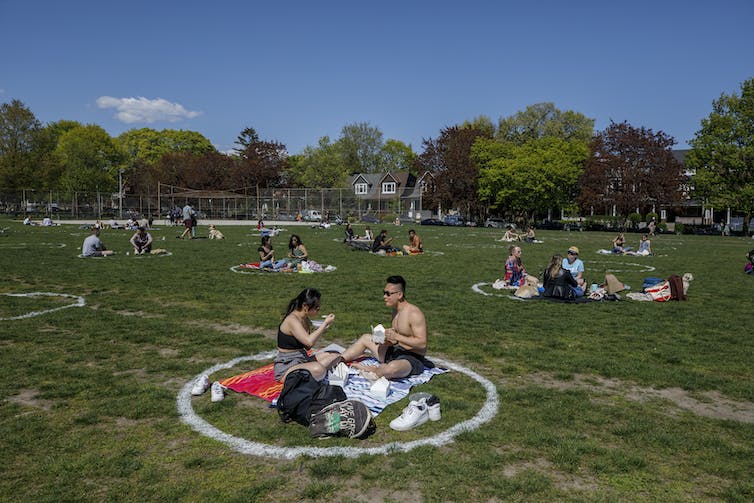In a recent special issue of the British Medical Journal (BMJ), commentators demanded accountability for Canada’s COVID-19 response in the form of an independent public inquiry. If such an inquiry is held, it must examine how — and with what consequences — politicians’ pandemic messaging deflected responsibility for controversial decisions onto scientific evidence and experts.
During the COVID-19 pandemic, it was common to hear politicians say that they were “just following the science” when explaining their policies. Although this may sound like a prudent way to tackle a public health crisis, our research suggests that such claims can be misleading about both science and government.
Such claims also risk damaging the credibility of the very scientific experts who are crucial to an effective public health response.
Table of Contents
Decisions and ‘the science’
Scientific evidence and advice should be a key element of elected leaders’ decision-making in a public health emergency. However, this does not mean that scientific evidence should be the only input into such decisions, or that scientific advisors are responsible for those decisions. Yet this was how “following the science” rhetoric was often framed by politicians in Canada, Australia and the United Kingdom during the pandemic.

THE CANADIAN PRESS/Cole Burston
This messaging implied that there was such a thing as “the science,” and that it could tell politicians what to do. But as we saw repeatedly in the context of COVID-19, the scientific evidence (and experts’ interpretation of it) is frequently contested, constantly evolving and not always inclusive of the specific needs of diverse population groups.
Science can guide decisions, but it is not a magic eight-ball dictating what should be done.
Policy and evolving evidence
Even if science could provide unambiguous answers, there are compelling reasons why it should not be the only consideration in public health decision-making. In representative democracies, politicians are elected to make decisions that balance multiple priorities and interests — including scientific evidence, but also economic impacts, budgets, ethics, equity, time constraints and public opinion.
This is one reason why governments in the same country or region with access to the same scientific evidence and advice made different decisions about addressing the spread of COVID-19. Governments wrestled with — and came to different decisions about — issues such as balancing the virus-containment benefits of school closures with the implications for children’s well-being and parents’ labour participation.
If “just following the science” does not accurately represent science or policymaking, then why the ubiquitous rhetoric? These claims can be seen as attempts to de-emphasize politicians’ role in making potentially controversial decisions by deflecting responsibility onto a vague process (“the science”) or by positioning public servants, such as the chief public health officer of Canada or provincial chief medical officers of health (CMOHs), as responsible for decisions.
But this is not how governments are supposed to work in mature democracies like Canada. The convention of ministerial responsibility means that elected politicians, and not their advisors, make decisions and are accountable to the electorate. Stating or implying that policy responses are prescribed by advisors can confuse the public about who is responsible for decisions and risks weakening the relationship between public servants and politicians.
Messaging and mistrust
Misleading the public about the role of scientific advisors in decision-making can also undermine public trust in scientific advisors, particularly when policy decisions inevitably change or are controversial.
Early in the pandemic, elected leaders’ “just following the science” messaging implied that scientific evidence and advisors held straightforward answers to complex questions. As the pandemic evolved and scientific evidence, expert advice and policy decisions inevitably changed (and diverged across jurisdictions), public health restrictions were met with public confusion, frustration and even vitriol that was often directed at the scientific advisors who were presented as the public face of those decisions.
In Canada, the resulting mistrust was potentially made worse by the lack of transparency around government decision-making, which prevented citizens from understanding the extent to which scientific advice informed policy decisions.
Although we cannot be certain of the reasons, public opinion polling shows that trust in Canada’s federal and provincial CMOHs as reliable sources of information on COVID-19 declined steadily between 2021 and 2023. Such an erosion of trust between scientific advisors and the public has implications for governments’ ability to handle both chronic and acute public health emergencies.
The role of the CMOH is designed to put a trusted scientific figure — a doctor — in front of the public to explain and make recommendations on issues from flu vaccines to vaping to wildfire smoke. The trust and credibility associated with being a non-partisan doctor who represents the public interest is crucial to the role of CMOHs, but it becomes vulnerable when these officials are left to take the fall for politicians’ decisions.
Trust and transparency

THE CANADIAN PRESS/Graham Hughes
Where should governments in Canada go from here? An independent national inquiry that investigates (among many other issues) the implications of politicians’ distancing themselves from their decisions would be an important start.
It is in politicians’ interest to maintain relationships of trust with their senior public health officials, and between those officials and the public. Trust matters not just for managing the next pandemic, but for tackling the major public health challenges of our time, including health inequities, the opioid epidemic and the existential threat of climate change.
Politicians should realize that deflecting blame onto “the science” in their messaging is a short-term solution that can have long-term risks, and focus instead on crafting messaging that is more transparent about how, why and by whom decisions are made.
![]()
Adèle Cassola has received past funding from the Social Sciences and Humanities Research Council.
Patrick Fafard has received funding from the Canadian Institutes of Health Research, the Social Sciences and Humanities Research Council, and Health Canada. He consults for the Institut national de santé publique du Québec.

























